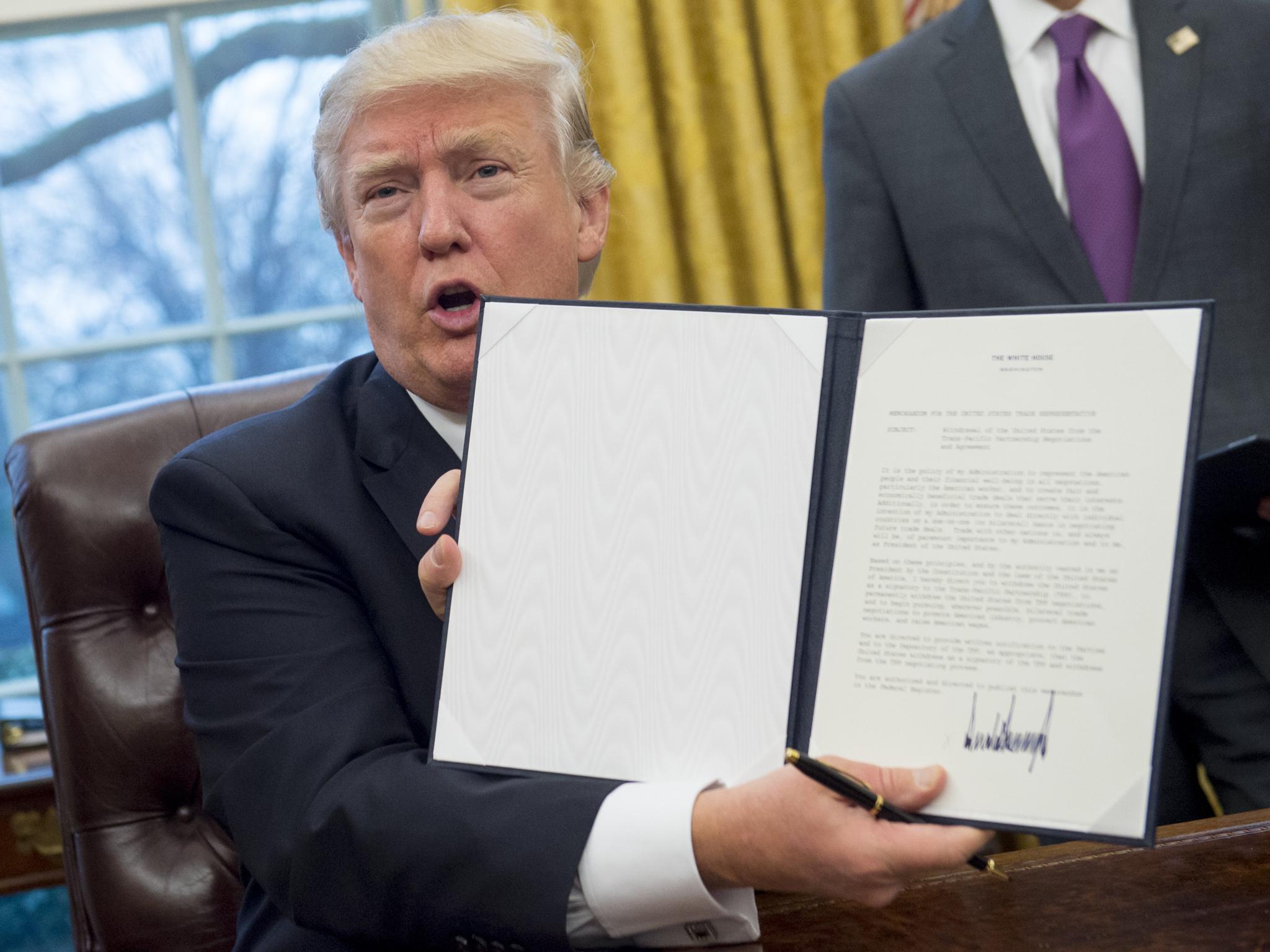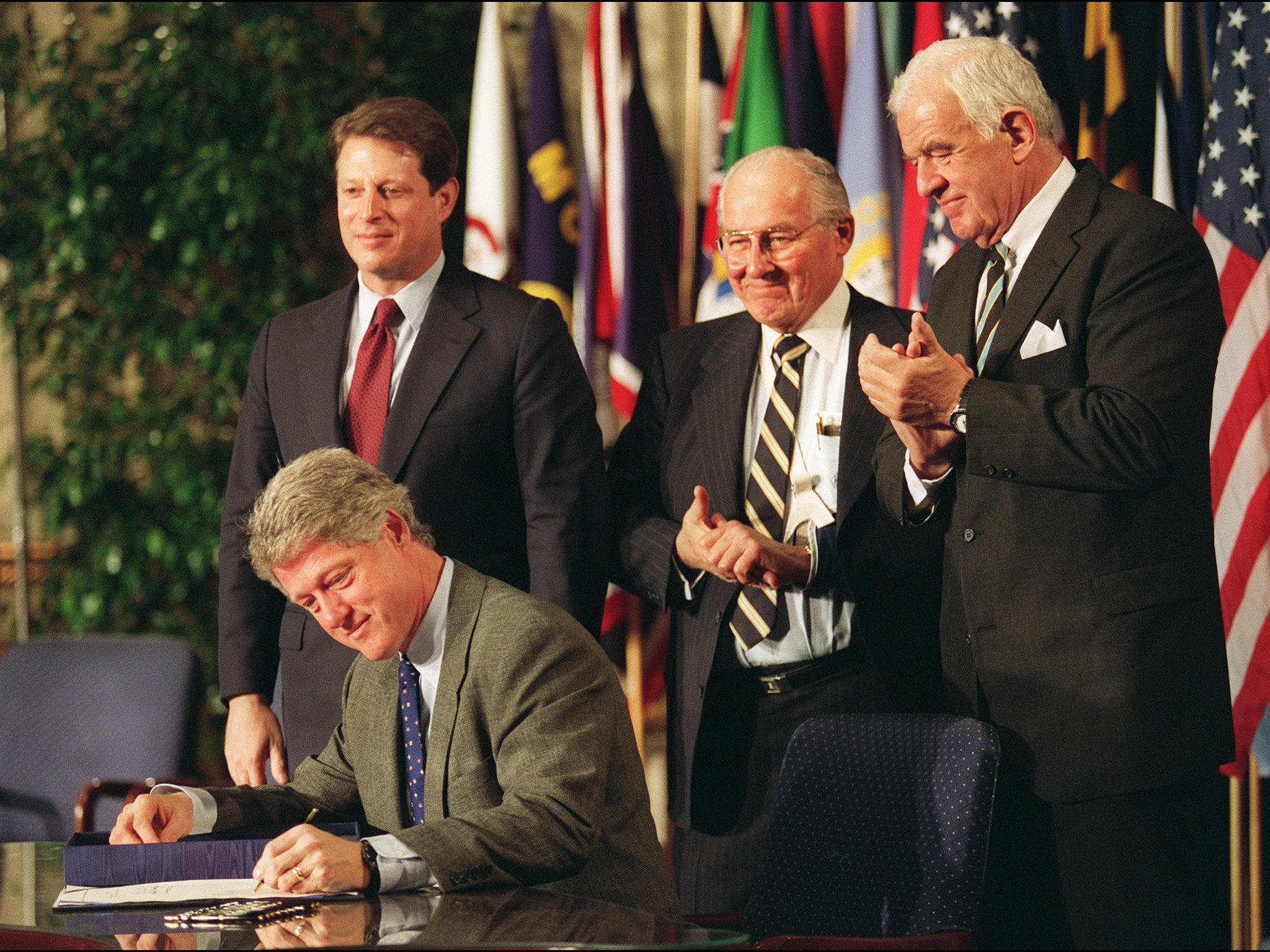President Donald Trump scraps TPP trade deal by executive order
One of three orders signed by the President, the TPP withdrawal was merely a formality as the proposal had yet to receive Senate approval

President Donald Trump signed an executive order withdrawing the US from the proposed Trans-Pacific Partnership trade deal.
Mr Trump kicked off his first full week in office by issuing the major reversal of Barack Obama's signature trade deal, pulling away from Asia.
The President strongly opposed the 12-country trade pact – a signature theme of his campaign – but the agreement had not yet received Senate approval, so the executive order was more of a formality.
The Senate was likely to scrap the agreement considering strong public anxiety over the deal. Democratic presidential candidate Bernie Sanders also campaigned against the TPP.
"Great thing for the American worker what we just did," Mr Trump said while signing the order in the White House Oval Office.
The order is a defection from Republicans in Congress who supported the trade deal, including House Speaker Paul Ryan. Mr Obama worked with the Republican leader to pass legislation to grant the President authority to negotiate the trade agreement. Ranking Senate Republicans were quick to criticise Mr Trump's decision to pull away from the TPP.

"President Trump’s decision to formally withdraw from the Trans-Pacific Partnership is a serious mistake that will have lasting consequences for America’s economy and our strategic position in the Asia-Pacific region," said Arizona Sen John McCain.
Democrat Sen Sherrod Brown said Mr Trump had made the "wrong decision" and that it would ultimately give China more influence over the region. But Bernie Sanders, who was a vocal opponent of the TPP during his presidential campaign, praised Mr Trump for his actions, saying the deal was "dead and gone".

"Now is the time to develop a new trade policy that helps working families, not just multi-national corporations," Mr Sanders said in a statement. "If President Trump is serious about a new policy to help American workers then I would be delighted to work with him."
Democratic Rep Keith Ellison echoed Mr Sanders' sentiment, and called on President Trump to follow up on the action and work to benefit working class Americans, not fellow billionaires.
"The activists, advocates, and American workers who have spent the past five years fighting this trade deal deserve the credit for bringing about the end of the TPP – not President Trump," he said in a statement for the Congressional Progressive Caucus. "It is up to President Trump to stand up to his billionaire cabinet and corporate boardrooms to create trade policies that benefit American workers, instead of increasing the profits and power of big corporations."
Mr Trump also plans to renegotiate the North American Free Trade Agreement, the pact between the US, Canada, and Mexico introduced by George HW Bush and pushed through Congress by Bill Clinton.
On Sunday, he said he scheduled meetings with Mexican President Enrique Peña Nieto and Canada's Prime Minister Justin Trudeau to renegotiate the two-decade-old trade agreement.
"We're going to start some negotiations having to do with Nafta," he said of his meeting with Mr Peña Nieto. He said he would also discuss immigration and border security with Mr Peña Nieto.
During the televised debates before the 2016 election, Mr Trump called Nafta "the worst trade deal maybe ever signed anywhere, but certainly ever signed in this country".
The President criticised such deals in his inaugural address, during which he promised an "America First" approach to foreign policy. The phrase is rooted in anti-Second World War rhetoric in the US, and has been criticised as being anti-Semitic.

"We must protect our borders from the ravages of other countries making our products, stealing our companies and destroying our jobs," Mr Trump said in his short, nationalistic speech on Inauguration Day. "Protection will lead to great prosperity and strength."
The TPP withdrawal order was one of three actions taken by the President in his third full day in office. He also ordered a freeze in government hiring and re-imposed a ban on providing federal money to international groups that provide abortions.
Mr Trump has criticised international free trade deals for rewarding companies for outsourcing work and has attributed the loss of US manufacturing to foreign labour.
Earlier in the morning, Mr Trump met with US business leaders and said that he plans to penalise companies that ship their jobs overseas.
"If you go to another country and you decide that you're going to close and get rid of 2,000 people or 5,000 people ... we are going to be imposing a very major border tax on the product when it comes in," he said in the meeting, which included Tesla CEO Elon Musk and Under Armour CEO Kevin Plank.
President Trump is expected to devote his first week in office to undoing much of Mr Obama's work during his two terms in the White House, including the TPP, the global abortion "gag rule", and a reversal of his predecessor's executive order to defer deportation of some 700,000 undocumented people brought to the US as minors.
Bookmark popover
Removed from bookmarks